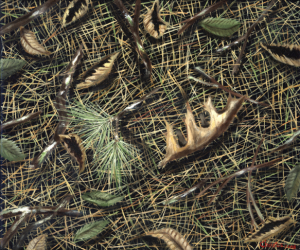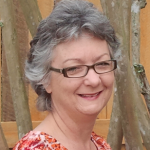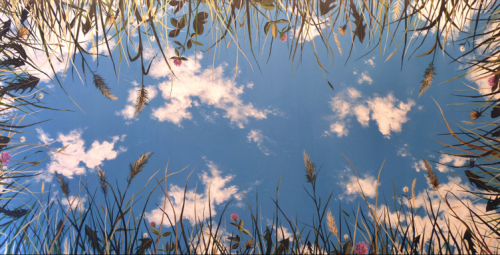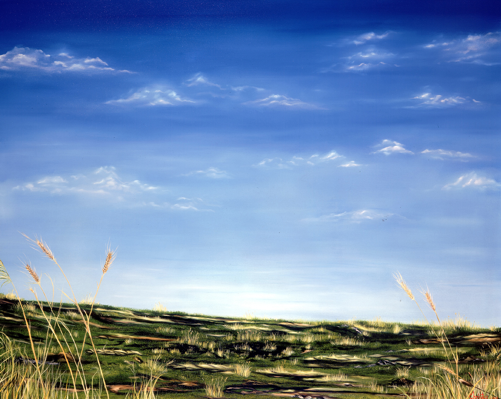Theme Essay by Inez Holger
The Gift of Solace
My father avoided Mother Earth as best he could. Of the few black-and-white photographs I have of him—in his army uniform, standing next to his new French bride; in his starched white shirt with black suspenders, holding a deck of cards; in his striped pajamas with cheeks bulging from popcorn as he grabs a snack in the kitchen—none capture a man enjoying the outside world.
The one of him and my mother kissing in a bale of hay out in a Provence field, well, that’s the closest to hugging the Earth I ever saw him do.
Instead, he spent his life studying words, looking at patterns and cadence, at derivation and grammar, at structure and culture. He analyzed foreign languages, dissecting meaning from the “dead” languages of Latin and Greek and from the modern Romance languages of French, Spanish, Italian, and Portuguese. My father, a high school teacher and then a professor, obsessed over the mother tongues of Europe.
His avid studies seemed to energize him. In his later years as a widower, he lined the guest beds, couch, and floor with his papers. I think he could have spent the rest of his days reading and writing, cocooned in his sheaved rooms.
I, however, have always needed to see the sky, watch the hawks hover and loop overhead, study the branches and leaves of different trees as they swirl or tremble in the wind. I find solace outdoors. That’s soulagement in French, solaz in Spanish, consolazione in Italian, consolacao or alivio in Portuguese.
I feel the smooth s and the soft g and the sliding z all adding to the sense of each word’s meaning: to console or soothe. And saying alivio makes me feel alive. In German, which my father learned in the war, it’s trost, quite a bit different from the Romance languages of his studies. But perhaps my father found solace in his choice of words, a rocking cadence, a pattern of sorts: soulage, solaz, solazione, solacao.
A year before he died at age 80, he revealed to me a silent pact he had made for his family, a pact that might balance out what he could not give in comforts and goods on his teaching salary. He sat in a wheelchair by the nursing home door, upright as Commander Sulu at the controls of the Enterprise, wearing Hush Puppies.
“I always gave you woods to play in,” he said. He spoke softly, as if in apology, or perhaps he was staring at the scales of what he had done for his kids and hoped with all his soul he’d done enough.
At the time, his claim struck me as odd, considering how much he avoided fresh air. He’d been raised in a cramped mill town by the thin Shetucket River in Connecticut where his Canadian forebears had settled, and he lived for a few years in a Catholic orphanage. Studying occupied him full time.
After college, he entered the army in 1940, where he experienced the world outdoors in ways that might have convinced him to stay indoors when he got home.
Swollen rivers had sucked his comrades away. Tanks buried in the dark earth had erupted upward like feral beasts. He’d climbed mountain embankments studded with bombs, dodged dense hedgerows flush with snipers, and interrogated POWs encamped on a simmering African desert. I never asked, but I think the war affected his view of the world and of pleasure in general. Forget an eco-tour—he kept to his books. Didn’t even weed the yard.
For as many memories as I have of wandering outside, I have as many of my father seated in his nubby swivel chair with a thin sheet of polished pine resting on its arms. Students’ papers covered the surface. He taught throughout the school year, and then trained men in military intelligence at Fort Dix during the summer.
After he died, I mulled over his gift to us, weighing its value, not sure the trade-off compensated for what I had missed as a kid. I’d spent so little time with him, I barely knew him. Well, then, woods. What was he thinking?
• • •
You know how it is, how we misunderstand a person’s translation of events until someone else spells it out for us. While studying nature writing years after my father’s death, author Michael Pollan’s description of his childhood explained the gift’s value for me.
Pollan, in his book Second Nature, recounts that as a boy, his upward view from the base of a forsythia bush was “as grand as the inside of a cathedral.” His words registered something I’d felt as a child, but had no way to express. Something I’d sensed while sitting in the top of a pine tree while the breeze blew, or when, at the end of summer, tiny frogs swarmed on the long sliver of beach by the pond, darkening the sand.
Pollan’s study of nature and culture led me to a study of my own. Since the fourteenth century, cathedrals and churches have been known as sanctuaries (Anglo French sentuarie, sanctuarium in Latin), sacred places set aside for worship. In the nineteenth century, land set aside for wild plants and animals to live and breed safely became known as sanctuaries also. The previously religious word expanded to encompass any place of refuge or protection.
 I saw it then, finally, or at least part of it: My father, a devout man, had given his children nature’s cathedrals in which to stand in awe. The man who’d taken a mortar shell to the leg in the war had given me sanctuary.
I saw it then, finally, or at least part of it: My father, a devout man, had given his children nature’s cathedrals in which to stand in awe. The man who’d taken a mortar shell to the leg in the war had given me sanctuary.
Let me introduce myself: the sickly whiner. Those bushy cathedrals buffered my timid, gawky soul—especially when the Chase girls gave me a thrashing. I’d head off to the trails by the pond or up the hill into the woods afterward and take refuge, a bit like my parents headed to church to light candles when the going got rough.
The first home I can remember was an old summer cottage (rented out by the Chases), not built to withstand severe New England winters. We lived in the rented two-story house in Massachusetts, equipped with one floor heater during the chillier three seasons of the year. We had to close off the upstairs and sleep around the heater on cots during the winter, but outside my brothers and I dug igloos into drifts, sledded in the hollow, and skated on Long Pond around the bonfires we built. An audience of birch tress watched as I accepted a gold medal for my Olympic figure eights. Swimming, blueberry picking, and fireflies came when the weather warmed.
All the while, my dad worked on his doctoral dissertation at nights and on weekends, counting and categorizing the 2,413,917 words found in ten French textbooks. I wanted more time with him, but outside my brothers and I went, and, like trusty labs, we zigzagged and sniffed, hunted down the choicest hiding places, and brought treasures home.
I have been bringing bits of the outdoors home as long as I can remember: bark, nests, shells, seed pods, feathers, and striated stones. The feel of them quiets me, like rosary beads in my hands, full of mystery and certainty.
From there, we moved to a ranch-style home that backed up to a dairy farm. Two streams ran through the woods on either side of the farm on which one huge boulder sat in the middle. With my mother ill and one of my brothers free falling and in serious trouble, I went for long walks in the woods and fields, à la Thoreau, the Walker Errant, long before I knew anything about him. I became a pilgrim at a no-name creek, watching the sky undulate with birds each fall.
At home, my father took care of my mother and graded papers in his chair.
• • •
As a parent myself, I can now see he did the best he could with what he had. Are we ever enough for our children? May my two sons be fair in their translation of me.
I always gave you woods to play in.
I’m a long way from those woods now, in a suburban plot in Florida, with chairs positioned in various spots around the yard. I sit and reflect here on the damselflies I see, on purple iris and azaleas, cedar waxwings by the hundreds, and my father and me.
A few years before he died, my father went on a safari in Africa, a tour of nature in a country where he’d once left tank tracks in the sand. He had already traveled for years, but only to bustling cities like Hong Kong, Dubai, and Rome. After this trip, he came home with a photograph of his close encounter with something wild.
“A baboon,” he said, his hands thrust forward, palms up, as if the animal were lying across them. “He ran right across my path by the door of the hotel.” A hotel guest had caught the moment on film, a blurry brown creature lunging out of the frame.
“What did you do, Daddy?”
“I didn’t have time to do anything.” He shook his head. “It was huge. Not like what you see on TV.”
“And you rode an elephant?”
He started to laugh at the memory. “Ah, ghedon,” he said, using an old French-sounding nickname that always made me feel good—not because I knew its meaning or spelling (I didn’t), but because he had a word especially for me.
“His skin, his ears, his trunk. If you could have been there.”
My sedate and studious father, wowed. The professor and translator groping for words, totally amazed.
At age 77, he’d discovered the cathedral of wonder I’d found outside. And I, the puny, silent one, have finally discovered the structure and beauty of words he found, inside.
Adieu, mon pere.
Publishing Information
- Second Nature: A Gardener’s Education by Michael Pollan (Grove Press, 1991).
Art Information
- "Inner Strength" © Christos Hamawi; used by permission.
- “Silent Retreat” © Christos Hamawi; used by permission.
- "Eternal Meadow" © Christos Hamawi; used by permission.
 Inez Holger writes about family, faith, and mental health. Her essays have appeared in various journals and anthologies such as Bellevue Literary Review, Utne Reader, Relief: A Christian Quarterly Expression, and Greenprints.
Inez Holger writes about family, faith, and mental health. Her essays have appeared in various journals and anthologies such as Bellevue Literary Review, Utne Reader, Relief: A Christian Quarterly Expression, and Greenprints.
“Reconciliation,” a selection from a memoir in progress, received a Pushcart Prize nomination. To her surprise (and joy), it was listed in the "Notable Essays" section of The Best American Essays 2011.
Holger adds that a photo of her father still rests on her desk by an English dictionary and a ring of New England birch bark. But she can’t find a picture of the Chase girls anywhere.


